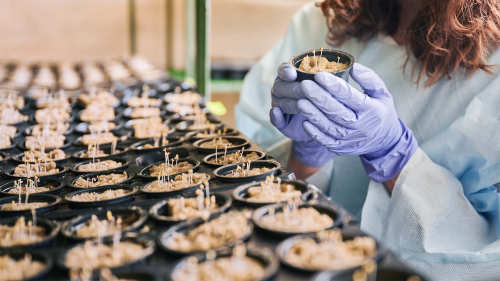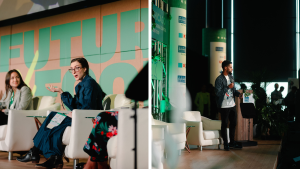From stockyards to plant protein, Chicago is a leader in global food innovation

Chicago already has one of the nation’s largest food manufacturing workforces. The city is positioning itself to become the global leader in food innovation and manufacturing.
Chicago has one of the nation’s largest food manufacturing workforces, and food innovation and manufacturing contribute an estimated $10.4 billion in nominal GDP to the area – more than in any other metro in the U.S.
“Food’s a big word when we think about it from an economic development perspective,” Abin Kuriakose of World Business Chicago told ChicagoGlobal.
This week, Kuriakose will lead the launch of World Business Chicago’s inaugural Future-of-Food Week, a summit connecting local startups in the food and beverage industry with venture capitalists and large companies like Mars Wrigley. The more than 120 participating entrepreneurs work up and down the industry’s supply chain, from R&D and manufacturing to distribution and restaurant tech. The goal isn’t just to connect startups with investors – it’s also to position Chicago as a global leader in food innovation.
“You know New York for finance, L.A. for entertainment, S.F. for technology,” said Kuriakose. “I’m a big believer that Chicago is the global capital for food.”
Is food Chicago's "right to win" industry?
Chicago has a few structural advantages that give it an edge in the industry, said Kuriakose. It’s the nation’s logistics hub. It’s in the middle of the country, sits near some of America’s most productive farmland, and connects to supply chain infrastructure including two international airports, an inland port, and six of the country’s seven Class I railroads.
That’s part of the reason food innovation and manufacturing productivity has grown 41.7% since Q4 2019, and the total number of Chicago-area businesses in the sector increased by 12.8% to 1,375 as of Q3 2023, according to World Business Chicago. That’s down from 2022, however, when there were nearly 1,600 businesses in Chicagoland in the sector.
In 2023, Luxembourg-headquartered food giant Ferrero – maker of Keebler and Famous Amos cookies – opened a 45,000-square-foot facility in the Loop.
Other multinational food and beverage companies are also expanding R&D operations in the city. In January, Mars opened a 44,000-square-foot Global Research and Development Hub at its Goose Island campus, investing $42 million in the facility.
Historically, the city was a hub for meatpacking and stockyards – infamously portrayed in Upton Sinclair’s “The Jungle” at the turn of the 20th century – and the sector still has a presence here today. In 2022, over 10,000 Chicagolanders worked in meat processing, and that was up 13% since 2019.
But many of Chicago’s food startups are moving past meat, and venture capital is biting. Over 60% of local food startups that received seed funding worked in alternative protein or other novel food products that rely on biotechnology.
Despite the industry’s historic ties to the city and Chicagoland’s competitive edge, macroeconomic challenges can make it difficult for early-stage, capital-hungry food startups to grow.

Virginia Rangos, CEO of Clever Carnivore (pictured left), and Ken Klay, CEO of FoodE (pictured right), at 2023's Chicago Venture Summit. Courtesy of World Business Chicago.
High interest rates and stubborn inflation have pushed some large companies to hold back on making big investment decisions, said Kuriakose. By connecting investors with early-stage entrepreneurs actively looking for fundraising, he hopes Future-of-Food Week will spur more investment in local food startups and help early-stage businesses weather economic headwinds.
“This is a sector where Chicago has a right to win,” said Kuriakose.
A global hub
International participation from investors and large companies in World Business Chicago’s startup-focused summits has grown year over year, said Kuriakose. That gives participating startups — the vast majority of which are based in Chicago — the chance to interact with a significant global market.
That’s one of the reasons that the Canadian Consulate in Chicago chose to co-sponsor Future-of-Food Week
“We’re one of the largest food producers in the world, one of the leading developers of the future of food,” Syed Sameer Ahmed, Consul at the Canadian Consulate, told ChicagoGlobal. He pointed to Canada’s plant-based protein sector as a particular strength.
“We have an expertise there that we would love to share,” he added.
Protein Industries Canada, a $173 million industry-led consortium of plant protein producers attending Future-of-Food Week, told ChicagoGlobal that Canada’s plant-based food sales and ingredient manufacturing are a $1.8 billion to $2.5 billion dollar market. The group advocates for expanding Canada’s food processing industry to $18 billion.
Ahmed points out that – with billions of dollars of trade crossing the U.S.-Canada border each day – the two countries' food and beverage supply and distribution chains are closely bound together.
“It’s one large North American market that we’re talking about,” he said. “It’s an integrated industry.”
The Canadian Consulate told ChicagoGlobal that Chicago’s food accelerators have helped several Canadian startups grow, including Stellar Eats and Sociavore. This week, Canadian firms will participate in Future-of-Food Startup Day pitch sessions, including firms working on autonomous cooks and restaurant brand management tools.
Kuriakose said international participants are recognizing that “Chicago has a fast-growing startup ecosystem.”
“Food startups,” he said, are “ not just a Silicon Valley thing — it’s a Chicago thing.”
This story first appeared in the ChicagoGlobal newsletter, a joint project of Crain's Chicago Business and the Chicago Council on Global Affairs.

